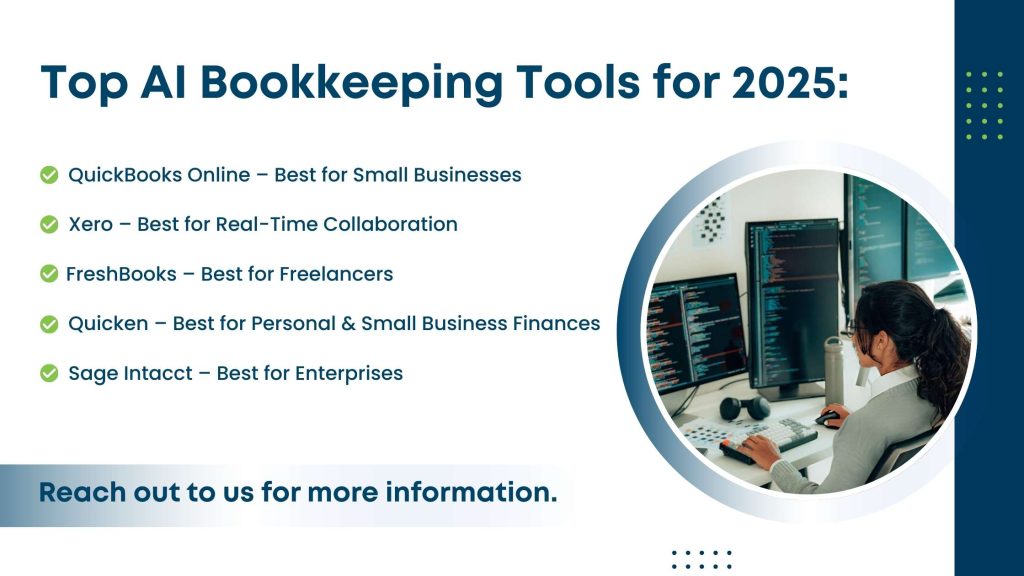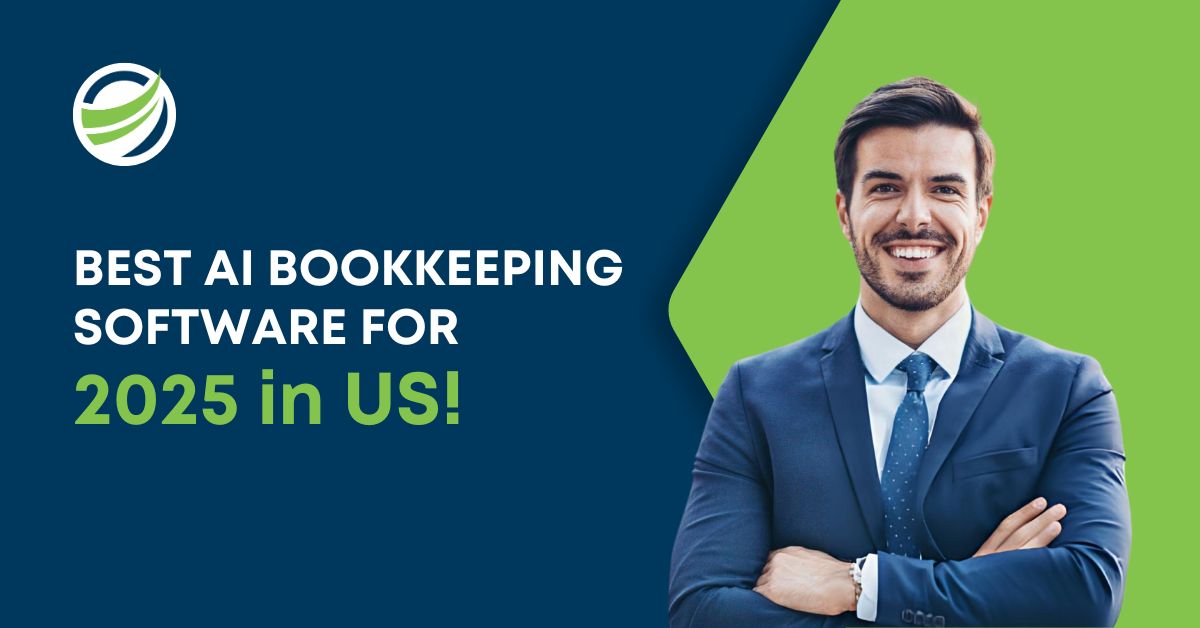- April 2, 2025
- by NCS Global
- 6mins read
Best AI Bookkeeping Software for US: How AI is Transforming Accounting in 2025
Bookkeeping has long been seen as a time-consuming, tedious task—one that business owners either struggle to manage themselves or outsource to professionals. But thanks to artificial intelligence (AI), bookkeeping is no longer just about crunching numbers manually.
It has transformed into an intelligent, automated process that saves time, reduces errors, and provides valuable financial insights.Businesses are increasingly turning to professional bookkeeping solutions to automate financial tasks, reduce errors, and gain valuable insights.
Imagine software that categorises transactions, reconciles accounts, detects discrepancies, and even predicts cash flow patterns all without human intervention. This is the power of AI bookkeeping tools and why they are becoming indispensable for businesses of all sizes.
Whether you’re a freelancer, a small business owner, or running a large enterprise, choosing the best AI bookkeeping software can simplify your financial management and help you make smarter business decisions.
In this guide, we’ll explore how AI is revolutionising bookkeeping, its key benefits, and how to choose the right software. Plus, we’ll review the top AI bookkeeping tools leading the market in 2025.
What is AI in Accounting & Bookkeeping?
AI in accounting refers to the use of machine learning, automation, and predictive analytics to streamline financial processes. Instead of manually entering transactions and reconciling accounts, AI-driven software can process data, detect anomalies, and generate reports in real time.
How AI Works in Bookkeeping:
- Automates data entry –
Captures receipts, categorises expenses, and reconciles transactions with minimal human intervention. - Detects financial discrepancies –
AI-powered algorithms flag unusual transactions, reducing fraud risks. - Provides predictive insights –
AI analyses financial patterns and forecasts future cash flow. - Simplifies tax compliance –
Tracks tax-deductible expenses and ensures accurate reporting.
AI is particularly useful for businesses looking for bookkeeping automation AI solutions to enhance efficiency and accuracy.
Benefits of AI-Powered Bookkeeping Software
1. Saves Time & Reduces Manual Work
Traditional bookkeeping is time-consuming, involving manual data entry, reconciliations, and calculations.With AI-driven virtual bookkeeping services, businesses can save time, reduce errors, and improve financial decision-making. AI automates these tasks, freeing up time for business owners and accountants to focus on strategic growth.
2. Enhances Decision-Making with AI Insights
AI-driven financial reports provide businesses with real-time insights into their cash flow, profitability, and financial health, helping them make data-driven decisions.
3. Improves Accuracy & Reduces Errors
Human errors in bookkeeping can lead to costly mistakes. AI bookkeeping software reduces errors by automating calculations, ensuring consistency, and flagging potential discrepancies.
4. Strengthens Fraud Detection & Compliance
AI-powered tools use anomaly detection to identify unusual transactions, helping prevent fraud and ensuring businesses remain compliant with financial regulations.
5. Cost-Effective Solution for Businesses
Instead of hiring large accounting teams, small businesses can leverage AI bookkeeping for small businesses to handle repetitive tasks efficiently and at a lower cost.
Key Features to Look for in AI Bookkeeping Software
Before selecting an AI-driven accounting tool, consider these essential features:
1. Automation Capabilities
AI should handle data entry, invoice generation, and bank reconciliations, reducing manual work and minimising errors. It should also track payments, send reminders, and flag discrepancies for quick resolution.
2. AI-Powered Financial Insights
Look for predictive analytics, budgeting tools, and real-time financial reporting. AI can analyse spending patterns, forecast cash flow, and provide instant insights to support smarter financial decisions.
3. Integration with Other Software
The software should seamlessly sync with banks, payroll, tax software, and payment platforms. Smooth integration ensures automated transaction tracking, accurate tax calculations, and efficient financial management.
4. Scalability & Business Needs
Choose software that grows with your business. It should support multi-user access, handle increasing transaction volumes, and adapt to different business sizes, from freelancers to enterprises.
5. Security & Compliance
Strong encryption, multi-factor authentication, and automatic backups are essential for protecting financial data. Ensure the software complies with industry regulations to maintain data integrity and legal compliance.

Best AI Bookkeeping Software for 2025
Here’s a breakdown of the leading AI bookkeeping tools for 2025:
1. QuickBooks Online (Best Overall for Small Businesses)
QuickBooks Online is an easy-to-use accounting software that helps small businesses manage expenses, invoices, payroll, and financial reporting. Its cloud-based platform and seamless app integrations make it a top choice for efficient financial management.
- Features:AI-driven transaction categorisation, automated bank reconciliation, smart receipt scanning, cash flow projections, and tax tracking. Seamless integration with payroll and tax tools.
- Best For: Small to mid-sized businesses looking for AI bookkeeping QuickBooks solutions.
2. Xero (Best for Real Time Collaboration)
Xero is a cloud-based accounting software that excels in real-time collaboration. It allows teams to access and update financial data simultaneously, making it perfect for businesses with multiple users. With features like invoicing, payroll, and bank reconciliation, Xero keeps everyone on the same page, anywhere, anytime.
- Features:AI-powered bank feeds, intuitive dashboards, mobile accessibility, automated invoice matching, and payroll integration. Ideal for multi-user collaboration.
- Best For: Businesses that require real-time financial collaboration.
3. FreshBooks (Best for Freelancers & Solopreneurs)
FreshBooks is an easy-to-use accounting software for freelancers and solopreneurs, simplifying invoicing, expense tracking, and time management. Its intuitive interface helps solo business owners stay organised and save time.
- Features: AI-powered invoicing, smart payment reminders, automated expense tracking, project profitability insights, and tax calculations.
- Best For: Freelancers and service-based businesses.
4. Quicken (Best for Personal & Small Business Finances)
Quicken is a versatile financial software that helps manage both personal and small business finances. It offers budgeting, expense tracking, invoicing, and tax features, making it ideal for individuals and small business owners looking for an all-in-one solution.
- Features: AI-driven budgeting, automated bill payments, investment tracking, tax organisation, and real-time syncing with bank accounts.
- Best For: Business owners managing both personal and business finances.
5. Sage Intacct (Best for Enterprises & Advanced Users)
Sage Intacct is a powerful cloud-based accounting software designed for enterprises and advanced users. It offers robust financial management features, including advanced reporting, multi-entity support, and automation, making it ideal for large businesses with complex financial needs.
- Features: AI-powered compliance, predictive analytics, fraud detection, automated workflows, and advanced financial reporting.
- Best For: Enterprises and finance-heavy businesses.
How to Choose the Right AI-Powered Accounting Software
When selecting an AI-driven remote accounting support solution, consider automation, integration, and scalability to ensure it fits your business needs
Follow these steps to select the best AI bookkeeping solution for your business:
Step 1: Assess Your Business Needs
- Do you need basic bookkeeping, full accounting automation, or tax management?
- Are you a freelancer, small business, or enterprise?
Step 2: Compare AI Features & Capabilities
- Does the software offer predictive insights, fraud detection, and automated invoicing?
- How well does it handle tax compliance?
Step 3: Consider Scalability & Integration
- Can the software scale with your business?
- Does it integrate with payroll, tax, and banking tools?
Step 4: Evaluate Cost & Budget
- Compare pricing, including hidden fees for AI features.
- Determine if the cost aligns with your business’s financial goals.
Step 5: Take Advantage of Free Trials
- Many AI bookkeeping software options offer free trials—test before committing.
Future of AI in Bookkeeping
AI is set to make bookkeeping smarter and more proactive. Predictive accounting will analyse past data to forecast cash flow and optimise budgets. Voice-activated bookkeeping will allow businesses to log expenses and generate reports hands-free.
Blockchain integration will enhance security, enabling real-time auditing and fraud detection. As AI advances, bookkeeping will shift from manual record-keeping to an intelligent financial assistant, offering real-time insights and smarter decision-making.
Conclusion
The best AI bookkeeping software isn’t just about automation—it’s about smarter financial management. Whether you’re a freelancer, small business, or large enterprise, AI can transform how you handle finances, making processes more efficient and error-free.
By understanding your business needs and evaluating the right features, you can select the perfect AI bookkeeping for small business or enterprise solutions.






